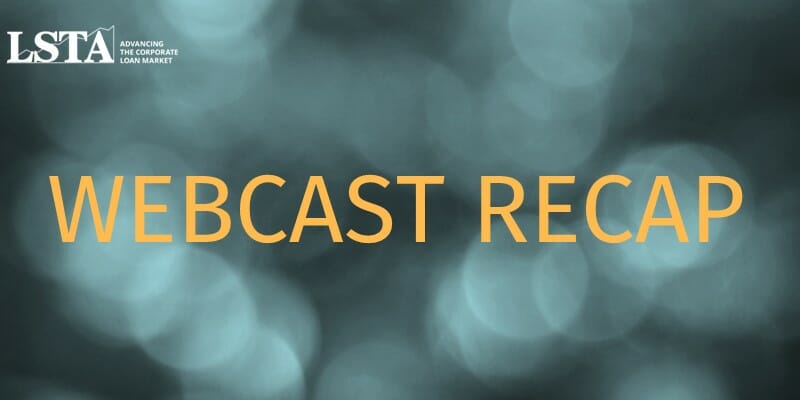July 28, 2023 - On July 26th, the LSTA hosted a webinar, “Corporate Transparency Act: What You Need to Know” presented by Dan Stipano, Partner of Davis Polk. The beneficial ownership information reporting rule (BOI Rule) is a rule issued by FinCEN, a bureau within the US Treasury Department. The Rule implements the provisions of the Anti Money Laundering Act 2020 (AMLA). That Act was meant to be transformative and modernize the US’s anti money laundering (AML) framework but little in it is self-effectuating. Rather AMLA relies on FinCen to implement it by publishing rules and regulations, and unfortunately, to date, AMLA has had little impact because only one rule has been finalized – the BOI Rule. The BOI Rule imposes a legal obligation to report information to FinCEN, and there may be enforcement consequences for those who fail to comply.
Financial transparency has been a concern of law enforcement for years because legal entities, such as shelf companies, are used by illegal types to engage in money laundering and other illicit activities. The US government participates in a Financial Actions Task Force – an international standard setting body which has published 40 recommendations for countries to adopt and thus have an effective AML regime. Periodically, that body evaluates how a country is doing implementing their recommendations. When the US was evaluated in 2006, we did well other than in the “customer due diligence” (CDD) category. We got a rating of partially compliant for CDD – which is like receiving a D grade. The US, therefore, tried to address this within its AML framework, and the CDD rule was introduced in 2018 by FinCEN. AMLA was passed in 2020 and included the Corporate Transparency Act (CTA).
The BOI Rule is due to take effect on January 1, 2024, and establishes the requirements for covered companies referred to as reporting companies to submit their beneficial ownership and company applicant information to FinCEN. The information will be inputted into the central database and provided to law enforcement. The BOI Rule is intended to provide law enforcement and financial institutions with the information necessary to better identify and prevent money laundering through corporate structures.
The BOI Rule is one of three rulemakings that FinCEN will promulgate in order to implement the CTA. The BOI is the first of these rules and the other is the “access rule”, which will govern access to FinCEN’s secure central database containing beneficial ownership information. The third rule will implement conforming amendments to FinCEN’s existing CDD Rule to conform it to the requirements of the CTA.
The effective date of the BOI Rule is January 1, 2024. The presenter noted, however, that FinCEN has not provided much public education for how to comply with this yet, although it will affect millions, and commented that he would not be surprised it that effective date slipped. The rule provides that reporting companies created or registered before January 1, 2024 will have one year to file their initial reports. Those reporting companies created after January 1, 2024 will be subject to a much tighter timeframe and have only 30 days after receiving notice of their creation to file their initial reports. Reporting companies must report changes in reported information within 30 days after the date in which the change occurred and must correct inaccurate information in previously filed reports within 30 days of when the reporting company becomes aware or has reason to know of the inaccuracy of information in earlier reports.
A reporting company is required within BOI reports to identify itself and report four pieces of information about each of its beneficial owners: name, birthdate, address, and a unique identifying number and issuing jurisdiction from an acceptable identification document. The rule identifies two types of reporting companies: domestic and foreign both of which are defined. There are however 23 types of entities that are exempted from the “reporting company” definition, including large operating companies, banks, credit unions, depository institution holding companies, broker-dealers, clearing agencies, investment companies, investment advisers, and other Exchange Act registered entities, and pooled investment vehicles. Thus. companies need to determine if they are a reporting company and then determine if they are subject to an exemption. “Large operating companies” is a curious exemption because money launderers can use the requirements as a road map to evade the requirements of filing.
Under the BOI Rule, a beneficial owner includes any individual who, directly or indirectly, either (1) exercises substantial control over a reporting company; or (2) owns or controls at least 25 percent of the ownership interests of a reporting company.
FinCEN is authorized to impose penalties on individuals, reporting companies, and other entities for willfully providing, or attempting to provide, false or fraudulent beneficial ownership information to FinCEN (including false identifying documentation); or willfully failing to report complete or updated beneficial ownership information to FinCEN.
The LSTA will monitor this topic in case the effective date slips or if guidance is published on the different issues of the BOI Rule which are open to interpretation which were identified during the presentation. Click here for the slides and replay.






